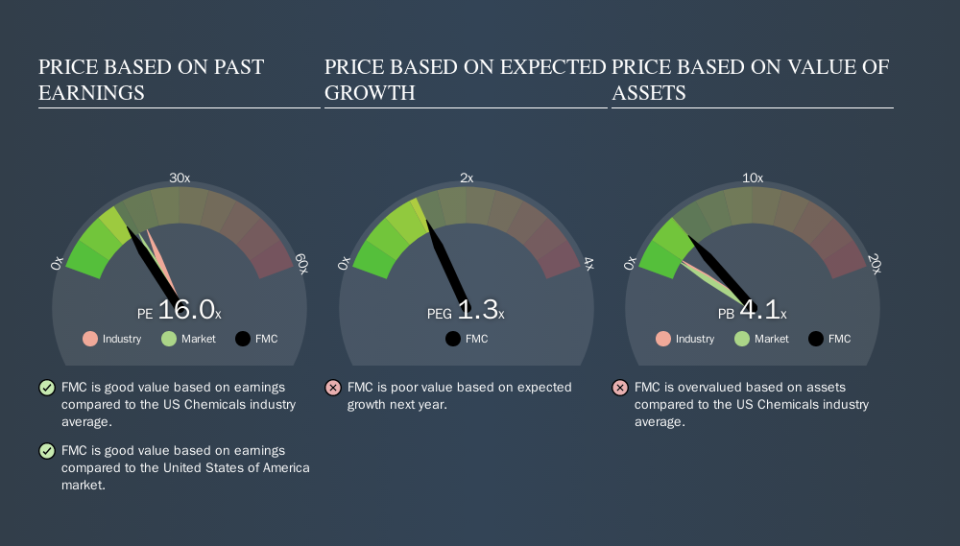Here's How P/E Ratios Can Help Us Understand FMC Corporation (NYSE:FMC)

This article is written for those who want to get better at using price to earnings ratios (P/E ratios). We'll show how you can use FMC Corporation's (NYSE:FMC) P/E ratio to inform your assessment of the investment opportunity. What is FMC's P/E ratio? Well, based on the last twelve months it is 15.96. That means that at current prices, buyers pay $15.96 for every $1 in trailing yearly profits.
View our latest analysis for FMC
How Do I Calculate FMC's Price To Earnings Ratio?
The formula for price to earnings is:
Price to Earnings Ratio = Price per Share ÷ Earnings per Share (EPS)
Or for FMC:
P/E of 15.96 = $86.13 ÷ $5.40 (Based on the year to June 2019.)
Is A High P/E Ratio Good?
The higher the P/E ratio, the higher the price tag of a business, relative to its trailing earnings. That is not a good or a bad thing per se, but a high P/E does imply buyers are optimistic about the future.
Does FMC Have A Relatively High Or Low P/E For Its Industry?
We can get an indication of market expectations by looking at the P/E ratio. The image below shows that FMC has a lower P/E than the average (20.3) P/E for companies in the chemicals industry.
This suggests that market participants think FMC will underperform other companies in its industry. Since the market seems unimpressed with FMC, it's quite possible it could surprise on the upside. If you consider the stock interesting, further research is recommended. For example, I often monitor director buying and selling.
How Growth Rates Impact P/E Ratios
Probably the most important factor in determining what P/E a company trades on is the earnings growth. Earnings growth means that in the future the 'E' will be higher. Therefore, even if you pay a high multiple of earnings now, that multiple will become lower in the future. Then, a lower P/E should attract more buyers, pushing the share price up.
In the last year, FMC grew EPS like Taylor Swift grew her fan base back in 2010; the 400% gain was both fast and well deserved.
Remember: P/E Ratios Don't Consider The Balance Sheet
The 'Price' in P/E reflects the market capitalization of the company. So it won't reflect the advantage of cash, or disadvantage of debt. Theoretically, a business can improve its earnings (and produce a lower P/E in the future) by investing in growth. That means taking on debt (or spending its cash).
Spending on growth might be good or bad a few years later, but the point is that the P/E ratio does not account for the option (or lack thereof).
Is Debt Impacting FMC's P/E?
FMC has net debt equal to 28% of its market cap. While it's worth keeping this in mind, it isn't a worry.
The Verdict On FMC's P/E Ratio
FMC trades on a P/E ratio of 16.0, which is below the US market average of 17.8. The company hasn't stretched its balance sheet, and earnings growth was good last year. If the company can continue to grow earnings, then the current P/E may be unjustifiably low.
Investors have an opportunity when market expectations about a stock are wrong. If the reality for a company is not as bad as the P/E ratio indicates, then the share price should increase as the market realizes this. So this free visual report on analyst forecasts could hold the key to an excellent investment decision.
Of course, you might find a fantastic investment by looking at a few good candidates. So take a peek at this free list of companies with modest (or no) debt, trading on a P/E below 20.
We aim to bring you long-term focused research analysis driven by fundamental data. Note that our analysis may not factor in the latest price-sensitive company announcements or qualitative material.
If you spot an error that warrants correction, please contact the editor at editorial-team@simplywallst.com. This article by Simply Wall St is general in nature. It does not constitute a recommendation to buy or sell any stock, and does not take account of your objectives, or your financial situation. Simply Wall St has no position in the stocks mentioned. Thank you for reading.

